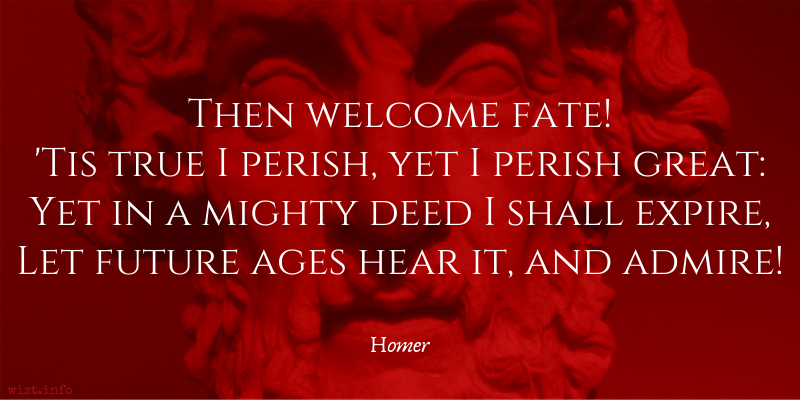He that will not when he may,
When he will he shall have nay.Robert Burton (1577-1640) English scholar
Anatomy of Melancholy, Part 3, sec. 2, member 5, subsec. 5 (1621, 2nd ed.)
(Source)
Quotations about:
last chance
Note not all quotations have been tagged, so Search may find additional quotes on this topic.
But let us die, go plunging into the thick of battle.
One hope saves the defeated: they know they can’t be saved![Moriamur et in media arma ruamus.
Una salus victis, nullam sperare salutem.]Virgil (70-19 BC) Roman poet [b. Publius Vergilius Maro; also Vergil]
The Aeneid [Ænē̆is], Book 2, l. 353ff (2.353-354) [Aeneas] (29-19 BC) [tr. Fagles (2006), l. 443ff]
(Source)
(Source (Latin)). Alternate translations:
Then let's incounter death, fall bravely on,
Vanquish'd men's safety is to hope for none.
[tr. Ogilby (1649)]
Then let us fall, but fall amidst our foes:
Despair of life the means of living shows.
[tr. Dryden (1697)]
Let us meet death, and rush into the thickest of our armed foes. The only safety for the vanquished is to throw away all hopes of safety.
[tr. Davidson/Buckley (1854)]
Come -- rush we on our fate.
No safety may the vanquished find
Till hope of safety be resigned.
[tr. Conington (1866)]
Let us die,
And plunge into the middle of the fight.
The only safety of the vanquished is
To hope for none.
[tr. Cranch (1872)]
Let us die, and rush on their encircling weapons. The conquered have one safety, to hope for none.
[tr. Mackail (1885)]
Fall on a very midst the fire and die in press of war!
One hope there is for vanquished men, to cherish hope no more.
[tr. Morris (1900)]
Forward, then,
To die and mingle in the tumult's blare.
Sole hope to vanquished men of safety is despair.
[tr. Taylor (1907), st. 47, l. 421ff]
Let us fight
unto the death! To arms, my men, to arms!
The single hope and stay of desperate men
is their despair.
[tr. Williams (1910)]
Let us die, and rush into the midst of arms. One safety the vanquished have, to hope for none!
[tr. Fairclough (1916)]
So let us die,
Rush into arms. One safety for the vanquished
Is to have hope of none.
[tr. Humphries (1951)]
Let us die, let us charge into the battle's heart!
Losers have one salvation -- to give up all hope of salvation.
[tr. Day Lewis (1952)]
Then let
us rush to arms and die. The lost have only
this one deliverance: to hope for none.
[tr. Mandelbaum (1971), l. 477ff]
Come, let us die,
We'll make a rush into the thick of it.
The conquered have one safety: hope for none.
[tr. Fitzgerald (1981), l. 470ff]
Let us die. Let us rush into the thick of the fighting. The one safety for the defeated is to have no hope of safety.
[tr. West (1990)]
Let us die and rush into battle.
The beaten have one refuge, to have no hope of refuge.
[tr. Kline (2002)]
All that is left for us
Is to rush onto swords and die. The only chance
For the conquered is to hope for none.
[tr. Lombardo (2005)]
Let us die even as we rush into the thick of the fight. The only safe course for the defeated is to expect no safety.
[Routledge (2005)]
Let's die by plunging into war. Our only refuge is to have no hope of refuge.
[tr. Bartsch (2021)]
Then welcome fate!
‘Tis true I perish, yet I perish great:
Yet in a mighty deed I shall expire,
Let future ages hear it, and admire![νῦν αὖτέ με μοῖρα κιχάνει.
μὴ μὰν ἀσπουδί γε καὶ ἀκλειῶς ἀπολοίμην,
ἀλλὰ μέγα ῥέξας τι καὶ ἐσσομένοισι πυθέσθαι.]Homer (fl. 7th-8th C. BC) Greek author
The Iliad [Ἰλιάς], Book 22, l. 303ff (22.303) [Hector] (c. 750 BC) [tr. Pope (1715-20), l. 385ff]
(Source)
Original Greek. Alternate translations:
But Fate now conquers; I am hers; and yet not she shall share
In my renown; that life is left to every noble spirit,
And that some great deed shall beget that all lives shall inherit.
[tr. Chapman (1611), l. 266ff]
But I will not fall
Inglorious; I will act some great exploit
That shall be celebrated ages hence.
[tr. Cowper (1791), l. 347ff]
Fate overtakes me. Nevertheless I will not perish cowardly and ingloriously at least, but having done some great deed to be heard of even by posterity.
[tr. Buckley (1860)]
My fate hath found me now.
Yet not without a struggle let me die,
Nor all inglorious; but let some great act,
Which future days may hear of, mark my fall.
[tr. Derby (1864)]
Now my fate hath found me. At least let me not die without a struggle or ingloriously, but in some great deed of arms whereof men yet to be born shall hear.
[tr. Leaf/Lang/Myers (1891)]
My doom has come upon me; let me not then die ingloriously and without a struggle, but let me first do some great thing that shall be told among men hereafter.
[tr. Butler (1898)]
Now again is my doom come upon me. Nay, but not without a struggle let me die, neither ingloriously, but in the working of some great deed for the hearing of men that are yet to be.
[tr. Murray (1924)]
But now my death is upon me. Let me at least not die without a struggle, inglorious, but do some big thing first, that men to come shall know of it.
[tr. Lattimore (1951)]
Now the appointed time's upon me. Still, I would not die without delivering a stroke, or die ingloriously, but in some action memorable to men in days to come.
[tr. Fitzgerald (1974)]
So now I meet my doom. Well let me die --
but not without struggle, not without glory, no,
in some great clash of arms that even men to come
will hear of down the years!
[tr. Fagles (1990), l. 359ff]
But now has my doom overcome me. But let me at least not die without making a fight, without glory, but a great deed having done for the men of the future to hear of.
[tr. Merrill (2007)]
May I not die without a fight and without glory
but after doing something big for men to come to learn about.
[tr. @Sentantiq (2011)]
And thou wilt give thyself relief if thou doest every act of thy life as if it were the last, laying aside all carelessness and passionate aversion from the commands of reason, and all hypocrisy, and self-love, and discontent with the portion which has been given to thee.
Marcus Aurelius (AD 121-180) Roman emperor (161-180), Stoic philosopher
Meditations, Book 2, #5 [tr. Long (1862)]
(Source)
Usually modernized, "And you will give yourself relief, if you do every act of your life as if it were the last, laying aside all carelessness and passionate aversion from the commands of reason, and all hypocrisy, and self-love, and discontent with the portion which has been given to you," and the source of the more common (and mixed-message) reduction of this aphorism, "Do every act of your life as if it were your last."
Alternate translations:
Go about every action as thy last action, free from all vanity, all passionate and wilful aberration from reason, and from all hypocrisy, and self-love, and dislike of those things, which by the fates or appointment of God have happened unto thee.
[tr. Casaubon (1634), #2]
Perform every action as if it were your last; if your appetites and passions do not cross upon your reason; if you keep clear of rashness, and have nothing of insincerity and self-love to infect you, and do not complain of your destiny.
[tr. Zimmern (1887)]
Do each act as though it were your last, freed from every random aim, from wilful turning away from the directing Reason, from pretence, self-love and displeasure with what is allotted to you.
[tr. Farquharson (1944)]
Approach each action as though it were your last, dismissing the wayward thought, the emotional recoil from the commands of reason, the desire to create an impression, the admiration of self, the discontent with your lot.
[tr. Staniforth (1964)]
Perform every action in your life as if it were your last, putting aside all aimlessness and emotional resistance to the choices of reason, and all pretense, selfishness, and discontent with what has been allotted to you.
[tr. Needleman/Piazza (2008)]





